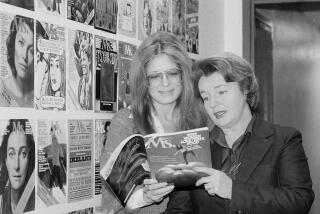He Has Misgivings About the Use of Ms.
- Share via
Last week, a letter to the editor in the New York Times caught my eye. I wish I’d saved it, but I didn’t, so I’m depending on my frequently faulty memory. The letter was from a woman who, as I recall, admitted to being at least in her 50s and still--perhaps determinedly--single. She didn’t like being referred to as “Ms.,” and she resented the acceptance of the use of Ms. by the New York Times style arbiters. (Ms. can be spelled with or without a period following it. The Times’ style is with a period. On the theory that, unlike Mr. and Mrs., Ms. is not an abbreviation, but a word in itself, I prefer to omit the period. It is surely one of the shortest vowel-less words in the language.
When the New York Times finally accepted Ms. as a form of address, it made news, and feminists rejoiced at this successful storming of a tenacious bastion of stylistic sexism. This woman, however, had always been content to be known as Miss Jones (I don’t remember her real name). Reading between the lines, I sensed, rightly or wrongly, a bit of defiance, as though she were saying, “I’m proud to proclaim myself an unmarried, independent Miss!”
She said that she thought Ms. was ugly, adding that it sounds like a Bronx razz. “A Bronx razz” is new to me. Maybe a fusion of “Bronx cheer” and “raspberry,” which mean the same thing. Not a bad name, but I’m baffled as to how Ms. sounds like that classic blast of derision. The Bronx cheer is impossible to render in letters, I think. It’s one of those sounds that cannot be spelled. In the comic strips it used to be something like “Br-r-r-a-a-a-ack!,” which doesn’t really make it. I think Ms. must be very low on my own list of possible spelled-out versions of a Bronx cheer.
What Ms. has always made me think of is a tall, lean handyman named Tex, who used to do odd jobs around our town when I was a boy. Although he was known as Tex, I’m pretty sure he wasn’t a Texan. He did wear a cowboy hat, and he had a vaguely Southern way of speech, when he spoke at all, which was seldom. I had a feeling his deck lacked most of its face cards. But in my childhood, he, more than any other, was the one with whom I associated the very common pronunciation “Miz” for “Mrs.” He used to drawl out things like, “Miz Mi’l’ton, ah got the leaves rake up. Wan’ me to start a bom-far?”
I was fully sympathetic with the search for an alternate designation to Miss and Mrs. I always sensed an injustice in the notion that women were expected to reveal their marital status by their courtesy title, whereas men were not. But now that we have the new word, it has become ever more difficult to know how to address a woman whose preference one isn’t aware of. Miss Jones is not at all unique in her dislike of Ms. I haven’t taken any polls, but I know there are many women, and not all of them in their middle years, who object to it. I can tell from the amount of correspondence I get whose return addresses are clearly designated Miss or, more often, Mrs., frequently with the title underlined.
It seems to me that the French have a rather graceful solution to the problem of women’s courtesy titles. A young unmarried woman is referred to as “Mademoiselle.” When she attains an unspecified but recognizable maturity, she--married or not--is called “Madame,” on the assumption, presumably, that anyone with her beauty and charm must be married or at least have been married by the age of about 25. Like most codes of conduct that make life run more smoothly, this rule cannot be hard and fast. The French are generally too smart to get rigid about as sensitive a social issue as the proper title for a woman. Leaving the title discretionary gives the gallant gentleman the opportunity to express flirtatious amazement when he discovers that the 40-year-old object of his attentions whom he has just called “Mademoiselle” is actually more than 18 years old.
I think Ms. is a valuable addition to the language and the culture, but I doubt that it will ever elbow Miss and Mrs. out of the picture, and I’m enough of a traditionalist to be glad Ms. hasn’t altogether swept the field.


